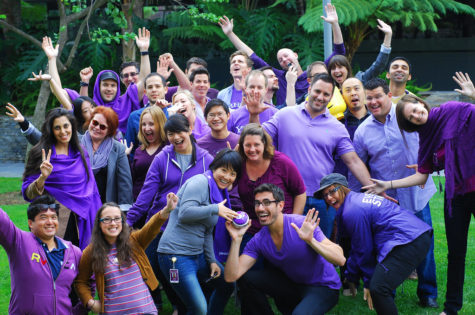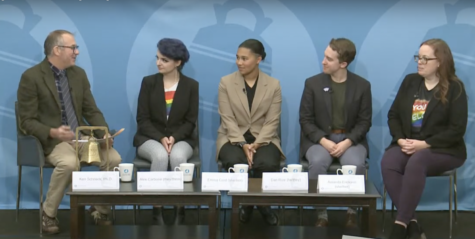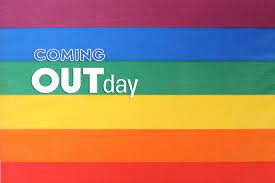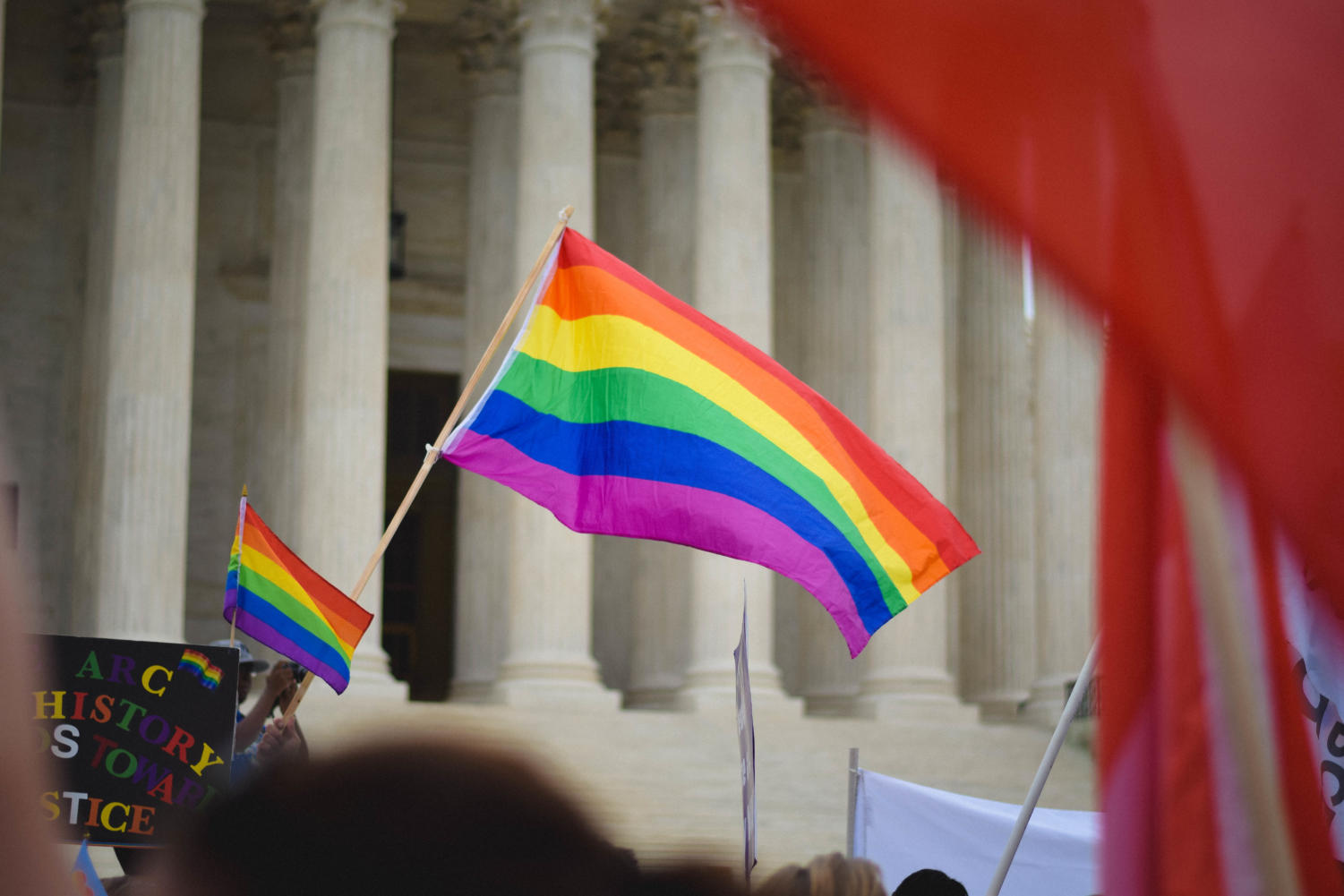Celebrating Spirit Day 2022!
Today - Thursday, October 20 - is Spirit Day. Read about what it is and why some Mentor students are commemorating it.
October 20, 2022
What is Spirit Day and why is it important?
Established by Brittany McMillan in 2010, Spirit Day was created to bring awareness to the bullying so many LGBTQ+ students face in their lives and attempts to counter it to avoid suicides from LGBTQ+ people. On Spirit Day, LGBTQ+ people and allies alike wear purple to to show their support against bullying and recognize the purple stripe of the pride flag, which represents spirit.

Spirit Day is primarily organized by GLAAD (Gay & Lesbian Alliance Against Defamation). GLAAD was formed in 1985 by a small group of journalists in response to an extremely harmful article by the New York Post regarding HIV and AIDS. They peacefully protested in front of the New York Post in December of 1985 to express the upset and hurt they felt. The Spirit Day anti-bullying campaign has been recognized by many celebrities, organizations, and even the White House in 2012.
According to the Trevor Project, LGBTQ+ youth are four times more likely to attempt suicide than their cisgender, straight peers, and it is estimated that at least one LGBTQ+ person attempts suicide every 45 seconds. That is at least 32 suicide attempts per day. Any simple show of support could help one of these kids, which could truly be life saving.
“Coming Out and Coming of Age”

On October 7th, the City Club of Cleveland hosted a panel of young LGBTQ+ people to discuss their experiences growing up as LGBTQ+ youth, especially with the increase in anti-LGBTQ+ legislation coming to the table in recent years. Florida’s House Bill 1557, known informally as the “Don’t Say Gay” bill, and Ohio’s House Bill 616, the number of anti-LGBTQ+ bills being targeted at young queer people has alarmed many in the community. LGBTQ+ activists and their supporters claim these bills tells LGBTQ+ kids that there is something wrong with them, or that they need to change to be accepted. These beliefs can be what drives isolation, mental health issues, suicidal thoughts and self harm or suicidal actions. Since these bills are heavily endorsed by adults, many queer children grow up seeing a world they conclude will not support them or love them.
Three Ohio bills currently on the table currently alarm the LGBTQ+ community, particularly transgender students. House Bill 454 would put a ban on gender affirming health care, spanning both mental and physical health, and if it was signed into law, could cause many LGBTQ+ people to wait until they are 18 to start living what they see as their true, authentic selves. The aforementioned House Bill 616 proposes a vague curriculum ban of “divisive issues.” In states that have passed similar legislation, banned issues deemed “divisive” frequently target LGBTQ+ topics and topics of race. LGBTQ+ advocates worry if these topics become something that teachers cannot discuss with their students, the history behind both LGBTQ+ folks and people of color will start to be erased. Lastly, House Bill 722 is similar to House Bill 616, in that if there are any classes where a parent or guardian does not like what could be discussed in them, the parent/guardian could take the child out of that class. This bill is vague enough for it to apply to many LGBTQ+ topics, such as a child having two moms.
One member of the Cleveland City Club panel on October 7 was Dan Rice (he/they), a transgender and queer person. Alex brought up that he spoke out against an Alabama bill preventing gender affirming care, and how he concluded that the people who pose such bills may not even know what they are talking about. Dan recalled being asked by a legislator, “What does transgender mean?” This lack of information can result in harm to the LGBTQ+ community, and makes it difficult for lawmakers to truly have a clear picture of what they are voting on.
When asked about things they’ve learned about navigating education as a member of the LGBTQ+ community, Alex Carbone (they/them), a queer and gender fluid senior at Hudson High School and City Club panel member, said two main things; safety needs to be first and comfortability can come second. Regarding safety, Alex recognizes how it may not be safe to be out, and how that can be a very discouraging and heavy thing for queer youth to carry. Recognizing this is important, in both personal safety and safety in who you are expressing yourself as. They said, “The biggest lesson I have learned is be thoughtful about who you tell,” meaning for both people who will accept you and people who may not.
Chosen family was brought up a lot during this discussion, meaning the people a person chooses to keep closest to them. Chosen family can be anyone around who supports a person, family or not. These people create a strong support system that can be part of who a person may come out to, and can help them through struggles that are not related to LGBTQ+ issues. Another of the young panel members, Emma Curd (she/her), a senior at Hoover High School, aid to “be yourself, and your friends and your family will love you for who you are.”
Upon being asked about what he would change right away in education for youth, Dan Rice said that he would put transgender and queer people into lesson plans. Growing up, his lack of knowledge about LGBTQ+ people made them feel alone and isolated, making growing up extremely difficult. Emma agreed, saying that while not only agreeing with Dan, she wants to increase the services available to queer children to help them when they need it.
Coming Out
Coming out, shorted from the phrase “coming out of the closet,” is when a member of the LGBTQ+ community shares with someone the side of them that is queer. This is typically in reference to self identification or romantic or sexual orientation. This can take a sizeable weight off of any queer persons shoulders, and is a milestone that can have an enormous impact on their future.
Alex came out in sixth grade, and every year since then, they have learned so much more about themselves, expressing that changing from the first time coming out is extremely normal and understandable. Between changes and fluidity, authenticity is extremely important for LGBTQ+ people, and that is what is cared about most – living their most authentic life.

National Coming Out Day was recently commemorated and has been every celebrated every year on October 11th since 1988.
Mentor’s take on LGBTQ+ issues
Mentor has waded into the “pronoun debates” at recent board meetings, especially after an administrative interpretation of current law that teachers may not need to inform parents if their child uses a name or pronouns different from that in Infinite Campus became the subject of debate and a national news story that appeared on the Fox News website. Some parents have claimed that it is be their right to know if their student uses a different name or different pronouns, and should immediately be informed. Others have been in support of the idea that saying that students have rights of their own in how they wish to be addressed, especially since it is in the classroom where students should feel safest. Members of the LGBTQ+ community worry that even just having the debate can not only pose harm to LGBTQ+ students, but can be dehumanizing as if they are pawns being moved from one side to the other. Supporters also worry if teachers can be forced to out a student before they are ready, the student could be put in harm’s way if they do not feel safe at home, and teachers would no longer be seen as as trusted resource nor classrooms a “safe space.”
In talking to an anonymous MHS student about the process of coming out and what it means to him, he agreed with Alex’s comments on the topic at the City Club panel, stating:
“Coming out to me is not a final decision of who you are, but rather a journey and/or process. People grow and develop who they are as we gain experiences from our day to day lives. You may feel that you are initially a lesbian, but you may discover a few years later that you are really transgender.”
The student went on to say:
“…being openly queer is one of the most basic forms of activism because most homophobia is rooted in the ignorance of people simply not knowing what a gay, lesbian, transgender, etc… person is.”.
Coming out is a very personal piece of any queer person’s journey, and in an ideal world, every queer person would choose the best possible moment for them to come out. Unfortunately, this is not always the case, which can cause lasting pain or harm for them as they continue to grow up depending on the reception they get. There is no formula for coming out, and it truly is a different experience for everyone.
Spirit Day hopes to encourage them on their journey.
Take GLAAD’s pledge against bullying for Spirit Day here!
